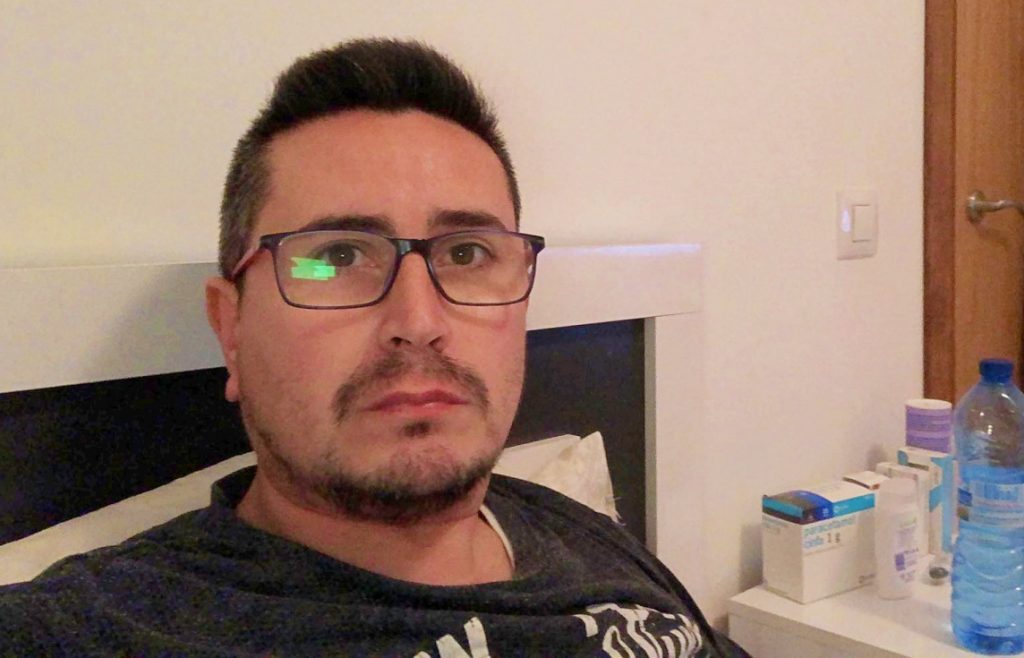COVID-19: A Personal Experience – “What is happening is very hard. But it’s real.”
Nicolás Tufiño speaks on his experiences after being sent to the A&E department at Dénia Hospital.

Thursday 4th February 2021 | NICOLÁS TUFIÑO (Xàbia AL DÍA)
I had had an almost constant fever for two weeks, so I had gone to my health centre and my doctor was struggling to keep down the 39° temperature that would rise if I did not take Algidol religiously every eight hours. Whenever I returned to the centre, they measured my blood pressure, oxygen and examined me. They also did the antigen and PCR tests (both negative). Later, I was sent to Moraira to give blood and urine samples for analysis as well as do the Mantoux test, which is done to find out if you have been in contact with the tuberculosis bacteria. But the fever was still there.
This past Monday, after informing me that the Mantoux test was negative, my doctor decided to send me to Dénia hospital, to simplify and streamline things. I must confess that at first I was not amused by the idea, knowing what is happening in almost all the hospitals in the region. A feeling between uncertainty and fear of going and not knowing what you are going to find. When I left home (because I went alone, it made no sense for anyone to accompany me), I couldn’t help but panic a little and felt quite sad. In these situations, you don’t know if you go and they decide to admit you … what if you don’t come back? What if it’s the last time you’ve said goodbye to your family without knowing it? I arrive at 11.30 am and they admit me to the “COVID suspects” waiting area, and what I observe for the next eight hours completely changes my way of thinking, so I would like to share my thoughts about several things.
First of all, I want to say that I am neither a doctor nor a health worker. All I am saying here is merely an opinion from the patient’s point of view.
The first thing that struck me was the way it was organized. There is a “dirty” area (COVID emergencies), and a “clean” area (non-COVID emergencies). There is a waiting room for confirmed patients and another for those with suspected cases which is where they put me.
The work done by our health workers is really impressive. I cannot express any word other than admiration. The arrival of ambulances is constant and, as the hours go by, there are also the ones who are arriving by their own means. The pressure on these professionals every moment that passes is huge, but nothing stops them. It looks like a hive where the naked eye can see apparent disorder, but the reality is that it is perfectly organized. Each one goes about their business and they know at all times what they have to do. Of course, those who arrive by ambulance always have priority. Sometimes the waiting times are extended, and when you are there for more than three hours, having to wait another 40 minutes is overwhelming, but it is not the fault of the health workers.
I have noticed it behind that suit, goggles and protective screen … I have noticed it in their eyes. They call you and the first thing they do is apologise for being late. Then, when you tell them not to worry, that we are seeing them do what they can, they stare at you for a moment, as if thanking you for that brief second of oxygen in their brain. As helplessly shutting up so many things that they want to scream, but they don’t because it is their job. Because they can’t even stop to say thank you.
The hospital porters must be athletes or something. I haven’t seen them sit down for a second. Taking people up and down to the bathroom, they accompany them here, there … and ALWAYS with a smile and a good disposition. Not even when a patient answers badly or raises their voice due to impatience or the same nerves do they complain, because they understand everything and know how to take the “public” in their place (they would make good waiters).
What is happening is very hard. Next to me was an 84-year-old English man. He came in around the same time as me. All day alone, sitting in his wheelchair without talking to anyone. Around 7.30 p.m. he calls his wife and the man puts the phone on hands-free mode. His wife, crying, asks him if she can go see him and he says no. As soon as they hang up, the man starts crying like a child. Of the six or seven people who were there, there was no one who could help but shed a tear. It’s so hard to see that. It is so impersonal. I fully understand that it is for everyone’s safety, but that does not mean that your heart does not break when you see something like that. Is this what happens to the health workers every day?
Finally, my diagnosis comes in: possible COVID pneumonia. Now I am confined to my room until the new result arrives. Anyway, I ask you please, whoever wants to read this, what is happening IS REAL. Let’s take the rules seriously, respect the laws, protect our own. It costs us nothing. People are dying. We have to remember that there are many people working very hard for and for us.
Nicolas Tufiño
Citizen and Resident of the Marina Alta
Click below to read this story in Spanish on Xàbia AL DIA




